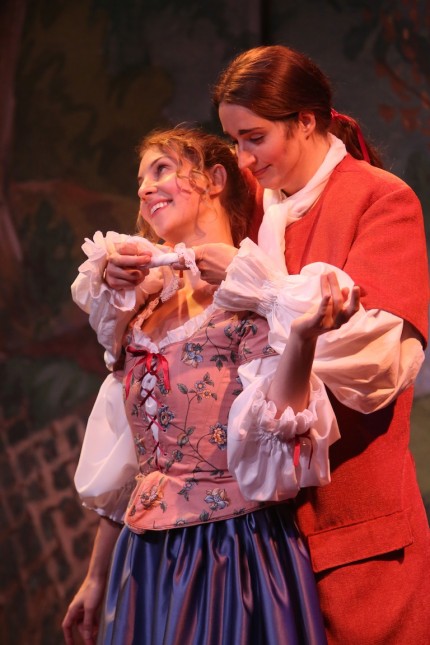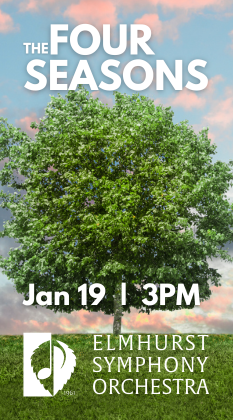Haymarket Opera opens season with charming production of Handel rarity

It was a courageous act for Craig Trompeter and colleagues to start up Chicago’s first Baroque/period-instrument opera company a year ago.
Haymarket Opera launched its second season Friday night with what is likely the belated local premiere of Clori, Tirsi e Fileno, presented at the company’s Mayne Stage home in Rogers Park.
More a pastoral cantata than a full-fledged opera, Handel’s 1707 comedy is a real obscurity. The tale tells of the triangle between the shepherdess Clori and the two shepherds, Tirsi and Fileno, who vie for her affections.
While the scenario of comic country matters is decidedly slender, Handel’s fount of melody is nearly as striking in this early work—the complete score was long lost and only rediscovered in 1960—than in his mature masterpieces. Handel knew a good tune when he had one and often raided Clori for material with several arias later showing up in Rodrigo, Rinaldo, and Acis and Galatea.
Haymarket Opera’s mission is to present early and Baroque operas in the same fashion as they would have been heard by audiences in their day, which was largely successful Friday night. The informal conviviality of the venue—cocktail lounge style with drinks available—suits this light-hearted fare.
Josefien Stoppelenburg was the clear standout in the three-woman cast. The statutuesque soprano was wholly convincing in the trousers role of the anguished, lovelorn Tirsi. Stoppelenburg sang with confidence and impressive agility, her bravura account of Tirsi’s Act 2 aria, sailing through the florid coloratura, eliciting the most enthusiastic ovation of the evening. The soprano was also the most engaged with the work’s comedy, her rangy physicality and mutable expressions consistently amusing.
As Clori, the object of Tirsi’s affections, Alison Wahl made a worthy shepherdess, displaying ease on stage and conveying the vixenish character’s coy, seductive qualities. Vocally Wahl was more mixed, singing gamely and gracefully though her light soprano sounded rather shallow even for this repertoire.
As Fileno, Tirsi’s rival in love, Angela Young Smucker delivered a capable performance but was less consistent at characterization than her colleagues. The mezzo-soprano proved a bit short-breathed in the virtuosic passages and fitfully uneven of pitch, though she sang with greater poise in Act 2 and her final aria.
The show was nearly stolen by Peanut, Smucker’s dog, the terrier-chihuahua mix making an assured and well-behaved company debut as Fileno’s canine companion, Arachide.
With an all-purpose pastoral unit set, there was less production bling here than in the company’s last effort, Charpentier’s La Descente d’Orphee aux Enfers, though the intimate staging suited this small-scale work. Ellen Hargis’s stage direction gets better with each Haymarket production, and there was a wry humor and greater fluidity in Clori that maintained the period style while avoiding didactic stiffness. The only problem was that the low stage made some action—like the entrance of Fileno’s little dog—invisible to groundlings seated near the back of the theater. The company may want to think about building a raised platform for their next production.
No complaints about the musical values. Cellist-music director Trompeter and colleagues delivered consistently vital and lively playing at the front of the stage, with the tangy asperity of the period instruments coming through effectively. Even in this early work, Handel was already displaying great resourcefulness in his scoring and the inventive string writing and gamboling pair of recorders added to the evening’s pleasures. Special kudos to harpsichordist Paul Nicholson and Michael Leopold whose archlute playing was consistently nimble and expressive, particularly his prominent obbligato solos in Fileno’s aria, Come la rondinella.
Haymarket Opera remains a wonderful addition to Chicago’s music scene. It would be great to see the company raise their game a notch with more consistent casting and presenting one longer, more ambitious work each season—perhaps one of the plethora of full-length Handel operas that have yet to be heard in Chicago.
Clori, Tirsi e Fileno will be repeated at 7 and 9:30 p.m Saturday at Mayne Stage. The company will present Purcell’s Dido and Aeneas February 15 and 16, 2013. haymarketopera.org.
Posted in Performances



